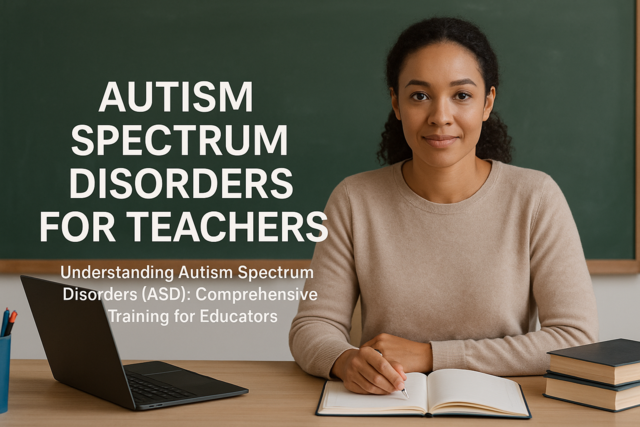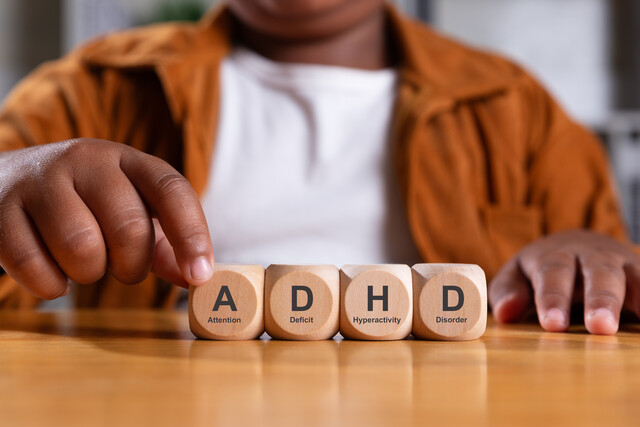Online Class: Applied Behavior Analysis Strategies for Teachers

-
9Lessons
-
19Exams &
Assignments -
10Hours
average time -
1.0CEUs
Course Description
Foundations of Behavioral Management
In an era where individualized approaches to education and care have taken the forefront, understanding the diverse needs of individuals with disabilities is paramount. Whether you are a parent, teacher, or paraprofessional, your role is crucial in navigating the complexities of behavior management for these unique individuals. With the growing number of people diagnosed with disabilities--estimated at over 1 billion worldwide according to the World Health Organization--it's clear that a comprehensive understanding of behavior management is not just beneficial, but essential.
Introducing our meticulously crafted course that bridges the gap between theory and practice, offering a blend of foundational concepts and hands-on applications. Dive deep into the science of behavior management, a realm that extends beyond mere definitions and delves into the intricacies of real-world settings.
Course Overview:
-
Introduction: Set the stage for your learning journey, understanding the significance and the broad landscape of behavioral management in the context of disabilities.
-
Applied Behavior Analysis (ABA): Dive deep into ABA, an evidence-based approach used extensively in managing behaviors. Understand its efficacy through contemporary research and real-world examples, like how ABA techniques are used to improve social skills in children with autism.
-
Behavioral Assessment: Grasp the importance of evaluating behavior. This module explores tools like Functional Behavior Assessments and their role in devising effective intervention strategies.
-
How to do Research: Equip yourself with skills to critically evaluate and conduct research. Learn the nuances of formulating hypotheses, selecting participants, and ethical considerations in behavioral research.
-
Measurement Procedures: Delve into the various techniques and tools used to quantify behavior. For instance, explore how time sampling can be used to capture the frequency of a specific behavior in classroom settings.
-
Introduction to Increase and Decrease Strategies of ABA: Learn the art of modifying behavior through reinforcements and consequences. A practical exploration, such as how positive reinforcement can increase classroom participation, will enhance understanding.
-
Self Management and Regulation of Behavior: Discover how individuals can be trained to recognize and regulate their own behaviors. Understand the role of self-monitoring tools and how they aid in improving focus and reducing impulsivity.
-
Introduction to Design: Understand the intricacies of designing interventions tailored to individual needs. Explore case studies that highlight the importance of customized strategies.
-
Presentation of the Data: Data drives decisions. Master the techniques of collating, analyzing, and presenting data in a way that it informs and influences educational strategies.
-
The Final Project: Consolidate your learnings by undertaking a project. Whether it's a case study analysis or a mini-research project, this will be an opportunity to apply all that you've learned.
Why Choose This Course?
Today, the global emphasis on inclusivity in educational and societal settings underscores the importance of understanding and managing behaviors of individuals with disabilities. As per the National Center for Education Statistics, approximately 14% of all public school students received special education services in the recent years. Therefore, the demand for professionals well-versed in behavioral approaches is continually rising.
This course is not merely an academic endeavor--it's a mission. A mission to create a world where individuals with disabilities receive the understanding, support, and opportunities they deserve. By enrolling, you're not just enhancing your professional or personal skills, you're becoming an advocate for change.
Join us in this transformative journey, where every lesson is a step towards creating more inclusive and understanding environments for individuals with disabilities.
Course Lessons
Lesson 1. Behavior Management 101
 Review Practice Worksheet: Lesson-1-HomeWork-10734.pdf
Review Practice Worksheet: Lesson-1-HomeWork-10734.pdf Lesson discussions: Reasons for Taking this Course
Lesson discussions: Reasons for Taking this Course Assessment: Lesson 1 Review Exam
Assessment: Lesson 1 Review Exam
Lesson 2. Behavior in Context: From Pavlov to Skinner
 Review Practice Worksheet: Lesson-2-Downloadable-10735.pdf
Review Practice Worksheet: Lesson-2-Downloadable-10735.pdf Assessment: Lesson 2 Exam
Assessment: Lesson 2 Exam Assessment: Lesson 2 Review Exam
Assessment: Lesson 2 Review Exam
Lesson 3. Behavior Focused Evaluation
 Review Practice Worksheet: Lesson-3-WordSearch-10736.pdf
Review Practice Worksheet: Lesson-3-WordSearch-10736.pdf Assessment: Lesson 3 Exam
Assessment: Lesson 3 Exam Assessment: Lesson 3 Review Exam
Assessment: Lesson 3 Review Exam
Lesson 4. Mastering the Art of Experimental Analysis: A Comprehensive Guide for Educators
 Review Practice Worksheet: Lesson-4-WorkSheet-10737.pdf
Review Practice Worksheet: Lesson-4-WorkSheet-10737.pdf Complete: Lesson 4 Activity
Complete: Lesson 4 Activity Assessment: Lesson 4 Exam
Assessment: Lesson 4 Exam Assessment: Lesson 4 Review Exam
Assessment: Lesson 4 Review Exam
Lesson 5. The Science of Measuring Human Behavior
 Review 5 Practice Worksheets
Review 5 Practice Worksheets Assessment: Lesson 5 Exam
Assessment: Lesson 5 Exam Assessment: Lesson 5 Review Exam
Assessment: Lesson 5 Review Exam
Lesson 6. Mastering Behavior: An Exploration of ABA Reinforcement Techniques
 Review Practice Worksheet: Lesson-6-HomeWork-10738.pdf
Review Practice Worksheet: Lesson-6-HomeWork-10738.pdf Assessment: Lesson 6 Exam
Assessment: Lesson 6 Exam Assessment: Lesson 6 Review Exam
Assessment: Lesson 6 Review Exam
Lesson 7. Mastering Self-Management: A Guide to Behavioral Regulation
 Review 4 Practice Worksheets
Review 4 Practice Worksheets Complete: Lesson 7 Activity
Complete: Lesson 7 Activity Assessment: Lesson 7 Exam
Assessment: Lesson 7 Exam Assessment: Lesson 7 Review Exam
Assessment: Lesson 7 Review Exam
Lesson 8. Ethical Considerations in Reversal Design: Balancing Control and Care
 Review Practice Worksheet: Lesson-8-Activity-10739.pdf
Review Practice Worksheet: Lesson-8-Activity-10739.pdf Assessment: Lesson 8 Exam
Assessment: Lesson 8 Exam Assessment: Lesson 8 Review Exam
Assessment: Lesson 8 Review Exam
Lesson 9. Visualizing Behavioral Data: A Study in Graphs
 Review 4 Practice Worksheets
Review 4 Practice Worksheets Lesson discussions: End of Course Poll; Course Comments
Lesson discussions: End of Course Poll; Course Comments Assessment: Lesson 9 Exam
Assessment: Lesson 9 Exam Assessment: Lesson 9 Review Exam
Assessment: Lesson 9 Review Exam
Learning Outcomes
- Define and explain key terminology and principles of applied behavior analysis (ABA) in educational settings.
- Demonstrate data collection procedures and techniques for behavior management in classroom environments.
- Define and describe the role of continuous measurement in determining the effectiveness of ABA interventions for behavior change.
- Identify and compare historical foundations and key figures in the development of behavior analysis, including their contributions to modern practices.
- Demonstrate the ability to conduct a functional behavioral assessment by correctly identifying antecedents, behaviors, and consequences in case studies.
- Identify the components of a formal behavioral assessment, including screening and intervention evaluation, with 90% accuracy using observational scenarios.
- Define and operationalize the dependent variable with 90% accuracy by providing objective, observable, and measurable descriptions.
- Identify and implement an independent variable, achieving a minimum of 80% improvement in target behavior once intervention commences.
- Demonstrate the ability to select an appropriate data collection method for a specific target behavior and justify the choice.
- Define the steps required to accurately measure and document a target behavior using various data collection methods.
- Demonstrate understanding of unconditioned and conditioned reinforcers by categorizing examples of stimuli into these categories.
- Identify and differentiate between positive and negative reinforcement, explaining how each type influences behavior increase.
- Define self-management and describe its benefits in promoting student independence and motivation.
- Demonstrate mastery of lesson content at levels of 70% or higher.
Additional Course Information

- Document Your Lifelong Learning Achievements
- Earn an Official Certificate Documenting Course Hours and CEUs
- Verify Your Certificate with a Unique Serial Number Online
- View and Share Your Certificate Online or Download/Print as PDF
- Display Your Certificate on Your Resume and Promote Your Achievements Using Social Media

Related Courses
-
 7 hours
0.7 CEUs
Introduction to Child Psychology
+ More Info
7 hours
0.7 CEUs
Introduction to Child Psychology
+ More Info
-
 4 hours
0.4 CEUs
How To Be a Substitute Teacher
+ More Info
4 hours
0.4 CEUs
How To Be a Substitute Teacher
+ More Info
-
 5 hours
0.5 CEUs
Building Self-Esteem in Children
+ More Info
5 hours
0.5 CEUs
Building Self-Esteem in Children
+ More Info
-
 7 hours
0.7 CEUs
Basic English Speaking Skills
+ More Info
7 hours
0.7 CEUs
Basic English Speaking Skills
+ More Info
-
 5 hours
0.5 CEUs
Basic Parenting Skills
+ More Info
5 hours
0.5 CEUs
Basic Parenting Skills
+ More Info
-
 9 hours
0.9 CEUs
Emotional and Behavioral Disorders
+ More Info
9 hours
0.9 CEUs
Emotional and Behavioral Disorders
+ More Info
-
 12 hours
1.2 CEUs
Business Math 101
+ More Info
12 hours
1.2 CEUs
Business Math 101
+ More Info
-
 6 hours
0.6 CEUs
Persuasion Techniques
+ More Info
6 hours
0.6 CEUs
Persuasion Techniques
+ More Info
-
 3 hours
0.3 CEUs
Understanding Learning Styles
+ More Info
3 hours
0.3 CEUs
Understanding Learning Styles
+ More Info
-
 7 hours
0.7 CEUs
Solving Classroom Discipline Problems
+ More Info
7 hours
0.7 CEUs
Solving Classroom Discipline Problems
+ More Info
-
 8 hours
0.8 CEUs
How to Be an Effective Administrative Assistant
+ More Info
8 hours
0.8 CEUs
How to Be an Effective Administrative Assistant
+ More Info
-
 7 hours
0.7 CEUs
Understanding Concussions
+ More Info
7 hours
0.7 CEUs
Understanding Concussions
+ More Info
-
 10 hours
1.0 CEUs
Learning Disabilities
+ More Info
10 hours
1.0 CEUs
Learning Disabilities
+ More Info
-
 7 hours
0.7 CEUs
How to Teach Reading Fundamentals
+ More Info
7 hours
0.7 CEUs
How to Teach Reading Fundamentals
+ More Info
-
 11 hours
1.1 CEUs
How to Write a Short Story
+ More Info
11 hours
1.1 CEUs
How to Write a Short Story
+ More Info
-
 5 hours
0.5 CEUs
Home Safety
+ More Info
5 hours
0.5 CEUs
Home Safety
+ More Info
-
 6 hours
0.6 CEUs
Romance Writing
+ More Info
6 hours
0.6 CEUs
Romance Writing
+ More Info
-
 5 hours
0.5 CEUs
Positive Parenting Techniques
+ More Info
5 hours
0.5 CEUs
Positive Parenting Techniques
+ More Info
-
 9 hours
0.9 CEUs
Autism Spectrum Disorders for Teachers
+ More Info
9 hours
0.9 CEUs
Autism Spectrum Disorders for Teachers
+ More Info
-
 7 hours
0.7 CEUs
Personality Development
+ More Info
7 hours
0.7 CEUs
Personality Development
+ More Info
-
 3 hours
0.3 CEUs
Empowerment for Single Parents
+ More Info
3 hours
0.3 CEUs
Empowerment for Single Parents
+ More Info
-
 3 hours
0.3 CEUs
Problem Solving Strategies
+ More Info
3 hours
0.3 CEUs
Problem Solving Strategies
+ More Info






